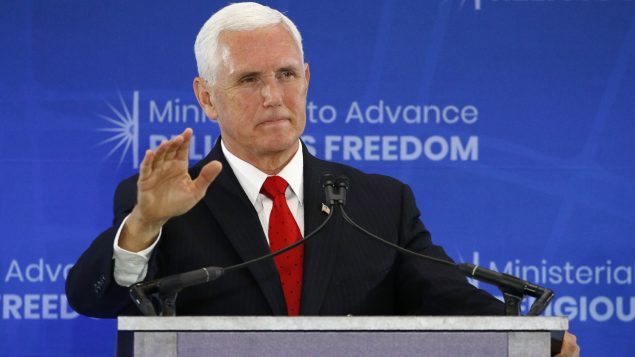
The wife of jailed Saudi blogger Raif Badawi and his supporters in Canada are welcoming comments by U.S. Vice-President Mike Pence Thursday calling on Saudi Arabia to release him.
Speaking at a conference on religious freedom in Washington on Thursday, Pence not only criticized human rights violations in China, Iran, North Korea, Nicaragua and Venezuela, but also raised the controversial incarceration of Badawi in Saudi Arabia, Washington’s close ally in the Middle East.
The 35-year-old blogger was arrested on June 17, 2012, and was later sentenced to 1,000 lashes and 10 years in jail for “insulting Islam.”
“In Saudi Arabia, blogger Raif Badawi is still in prison for the alleged crime of criticizing Islam through electronic means,” Pence said.
- Wife of jailed Saudi blogger met with Prime Minister Trudeau
- Canada ‘very alarmed’ by arrest of Raif Badawi’s sister in Saudi Arabia
Badawi’s wife, Ensaf Haidar, who lives in Sherbrooke, Quebec, with her three children, said the surprising mention of her husband’s plight was the first time a Trump administration official has publicly raised his case.
“Raif is not a criminal, he fights for the rights of women,” Haidar told Radio-Canada.
In another interview with The Canadian Press, Haidar said she would like to meet President Donald Trump to talk about how he can help free Badawi.
“Trump is the only solution at the moment,” Haidar told The Canadian Press.
Badawi’s first public flogging in January 2015, when he received 50 lashes, prompted international uproar, with human rights organizations condemning Riyadh and demanding his immediate release.
The Saudi government has postponed subsequent floggings due to Badawi’s fragile health but has not lifted the sentence.

Vice President Mike Pence speaks at the Ministerial to Advance Religious Freedom, Thursday, July 18, 2019, at the U.S. State Department in Washington. (Patrick Semansky/AP Photo)
In addition to Badawi, Pence called Abune Antonios, patriarch of the Eritrean Orthodox Church, Mohamed Cheikh Ould Mkhaitir of Mauritania and Junaid Hafeez of Pakistan prisoners of conscience who should be released.
“All four of these men have stood in defence of religious liberty and the exercise of their faith despite unimaginable pressure, and the American people stand with them,” he said.
“Today, the United States of America calls upon the government of Eritrea, Mauritania, Pakistan and Saudi Arabia to respect the rights of conscience of these men and let these men go.”
Marie-Pier Baril, spokesperson for Foreign Affairs Minister Chrystia Freeland, said the promotion and protection of human rights — including the right to freedom of expression, conscience, and religion or faith — is an integral part of Canada’s foreign policy.
“We remain extremely concerned by the case of Raif Badawi,” Baril said in a statement to Radio Canada International. “We have raised it at the highest levels and we have repeatedly called for clemency to be granted.”
Prime Minister Justin Trudeau has also spoken directly with the King of Saudi Arabia and Freeland has raised Badawi’s case with her counterpart, Baril said.
In January, Haidar met with Trudeau and Freeland to discuss her husband’s fate amid ongoing tensions between Ottawa and Riyadh.




